- Home
- Pat Barker
The Women of Troy: A Novel Page 13
The Women of Troy: A Novel Read online
Page 13
I’d been worried we might find the garden locked, but no, the gates stood wide open—it gave me a curious sense of being expected. No doubt the gardeners had gone to help drag the horse through the streets, and then perhaps been caught up in the celebrations, and never returned. Once we were through the gates, the high walls protected us and the wind was abruptly cut off. The tops of the orchard trees were tossing but at ground level once we were away from the open gate there was no more than a slight breeze. I felt we were being watched, not by human eyes but by the flowers that seemed startled by our presence. Masses of birds, the small, multicoloured, flickering kind who prefer seeds and ripe fruit to rotting carrion. They were enjoying a feast of their own with no gardeners to chase them away. Two whole rows of goldfinches lined up cheekily on the arms of a scarecrow—and seemed to know there was nobody left to fear.
We walked along the path between two huge plots of vegetables to the herb garden at the far end. Immediately, I started picking handfuls of coriander. Out of the corner of my eye, I saw Amina, who’d been staring at the burnt-out towers, kneel down and begin gathering herbs too—though I noticed she started at the other end of a row, too far away for conversation to be possible. Never mind, I could wait. I knew she was expecting to be interrogated, but I didn’t intend to oblige—not yet.
The humming of bees, the mingled scents of apple mint, thyme, rosemary, oregano, bay, the heat, like a hand pressing hard on the top of my head, sweat stinging my eyes…I lifted a hand to wipe it away and felt myself go dizzy—the garden was revolving around me. Carefully, I stood up and managed to get myself to a bench where I could sit in the shade. This wasn’t like me, but perhaps pregnancy made you more likely to faint? I closed my eyes and wished for water.
When I opened them again, Amina was standing over me. “Are you all right?”
“Yes, fine.”
I was feeling slightly better, but I can’t have looked it because she sat beside me. “Take deep breaths.”
I did as I was told, focusing my eyes on a clump of foxgloves until, gradually, the spinning stopped. I felt exhausted, empty. Looking around, I realized that everything here—every herb, flower and vegetable—had been planted by men who expected to see the next season, the next spring. Everywhere, there were signs of a normal day disrupted. A spade, its blade crusted with dry soil, lay at the end of a freshly dug row. On the bench, there was a square of red-and-white cloth wrapped round somebody’s half-eaten lunch: a hunk of bread and a slab of mouldy pale-yellow cheese with a bite taken out of it. Whoever it was, he must have been just starting his meal when the gates opened and the wooden horse was dragged inside—and he’d left, just like that, carelessly, without a second thought, expecting to return. He’d vanished into the shouting, celebrating crowds…
Nothing that I’d experienced that day, not on the battlefield, not seeing the dead fighter, not even hearing the buzzing of flies from inside the walls, had broken me; but this did: an unknown man’s teeth marks in a slab of smelly old cheese. I put my face in my hands and cried for the destruction of Troy, for the death of Priam and the ruin of his people.
I was only dimly aware of Amina as a blur of face and staring eyes, but then I felt her arms round me. She held me, rocking me, stroking my back, as tears and snot dripped out of me. “I’m sorry, I’m sorry,” I kept saying, until at last I was hiccupping and sniffing and wiping my nose on the back of my hand. After a while, I picked up the red-and-white cloth and used that instead. “Oh, god,” I said. “I don’t know what came over me—I don’t cry, I never cry.”
“There, there.”
She took off her veil and used it to dry my face—and then we just went on sitting in the shade. The ground around the bench was littered with mushy brown apples with a myriad dozy bees zigzagging drunkenly over the feast. Now that the storm of weeping was over, I felt flat again, desolate; but then, gradually, my mood began to lift. I gazed around at all the colours in the garden—the purples, blues, reds, greens, yellows, many of them so bright they even survived their immersion in the tainted light, for though we were sheltered from the wind the grey clouds had parted to reveal the usual orange glare. One day, I thought, I’m going to have a garden like this. I felt a stirring of hope, almost painful, like blood flowing back into a numbed limb. Amina was quiet beside me, looking up into the tree, at the moving leaves and branches. She’d made no attempt to console me except for that meaningless There, there—and I was grateful to her for that. Perhaps I should have spoken then, when we were momentarily close, but I was feeling too vulnerable. So, after a while, with no more than a glance at each other, we simply went back to gathering herbs.
At the centre of the garden was a built-up bed in the shape of a wheel, the spokes designed to contain the more prolific plants, those that would otherwise run wild and choke the rest. We worked our way round the circle, coming from opposite directions. The intimacy we’d achieved on the bench was ebbing fast, the tension between us growing as we got closer, until at last we met.
“Well,” I said. “Was it you?”
The lie she’d been about to tell died on her lips. “Why do you want to know? Wouldn’t it be better if you didn’t?”
I brushed that aside. “The thing is, he’s not going to suspect the women. At the moment, he’s thinking about Calchas—you know, the priest?—or Helenus, because they’re the only two Trojans in the camp—”
“I’m a Trojan.”
That stung. “So am I.”
“Yes, but it’s different for you, isn’t it?” Her gaze slid to my belly. “You’ve made your choice.”
“A choice? What choice do you think I had?” Deep breath. “Look, I’m trying to help. If you keep a low profile and don’t do anything silly, there’s every chance it’ll blow over. We can get through this.”
“We?”
“Yes! We.”
She gave an irritating smirk and I wanted to slap her. “You know he’s had the body dug up again?” I was watching her closely—and I could see that hurt.
“He tells lies.”
“Who does?”
“Pyrrhus. He told Andromache Priam died painlessly—he said it was quick—and it’s just not true. You wouldn’t kill a pig the way he killed Priam. And the awful thing is, Hecuba saw it. She begged Priam not to put his armour on, but he would do it—there was no way he wasn’t going to fight.”
“He did what he had to do.”
“Yes—so did I.”
What was becoming steadily more apparent as I listened to her was how stubborn she was, how impervious to reason. She reminded me of two women I’d known when I first came to the camp. Sisters. Every day at dusk, they’d set off for a short walk, arm in arm, heavily veiled, looking neither to right nor left, but always, modestly, down at their feet. And then, after about two hundred yards, without even needing to glance at each other, they’d turn round and walk back. On the surface, nobody could have been less like Amina than those two timid little women. And yet I saw the same inflexibility in her: the same refusal to accept that life has changed. It made her unreachable, and yet I felt I had to go on trying. “He’ll kill anybody who tries to bury Priam again now.”
“I know.”
I had to leave it at that. “Come on,” I said. “We may as well get some fruit while we’re here. It’s a shame to let it go to waste.”
The orchard was at the other end of the garden, a shady, rather mysterious place full of listening trees. The cherry trees had been covered in nets to keep out marauding birds but, standing on tiptoe, we were just able to reach one of the nets and pull it off. Amina climbed the tree and threw cherries down to me. I remember how they cascaded onto my face and arms, leaving red stains like splashes of blood. I was begging her to come down, I was frightened she’d fall, but she just went on pelting me with cherries—laughing, full of fun. They were ripe, overripe, we couldn’t resist eating
them and they were delicious. I turned to her, and noticed she had two red ticks at the corners of her mouth, pointing her lips in the direction of a smile.
We were so nearly friends.
The journey back was a hard slog. The baskets were heavy, and now we had the wind blowing directly into our faces. I realized looking ahead of me that the wind was invisible on the battlefield: there were no trees to be uprooted; no plants to be flattened. We struggled on across the dead land. I’d misjudged how long it would take and dusk was falling before we were halfway across. The evening roost was just beginning. In the failing light, the birds were almost invisible against the black soil until, late and reluctantly, they moved. I put the baskets down, waving and clapping my hands, but nothing frightened them. They cawed their triumph, the conquerors—and conquerors they certainly were with their crops crammed full of human flesh. We skirted round them as best we could, but it was a relief to reach the trench, to see lights and hear voices. I was so desperate for the warmth and relative safety of the compound that I almost ran the last hundred yards.
17
The hut was dark and silent when I got back. I groped my way into the living quarters, which at first I took to be empty, but then I noticed an oblong of deeper darkness by the bed. With shaking fingers, I lit an oil lamp and Alcimus’s shadow leapt across the floor.
“You’ve been gone a long time.”
“We’re running short of herbs, I—”
“I was worried.”
“I’m sorry. Is there anything I can get you?”
“I’ll have a cup of wine—and pour yourself one too. We need to talk.”
I poured two cups and set them down on the table. We sat facing each other, but despite what he’d just said he didn’t immediately speak. I knew I mustn’t ask questions about Priam’s burial—it might be rash even to express an interest—but I couldn’t help myself. “Did you find Helenus?”
“Yes, he was with his sister.”
I made myself wait.
“He just looked Pyrrhus in the face and said he wished he had buried Priam. He said he was ashamed somebody else had had to do it—it should have been him.”
“Was he…?” Tortured, I wanted to ask. That was my great fear: that somebody else would pay a terrible price for what Amina had done. I forced myself to say the word.
Alcimus was staring down into his cup. “No, no need, he’s a broken man. Once a man breaks like that, betrays everything, there’s no way back.”
Silence. I watched the shadows creating hollows in his cheeks. “What did you want to speak to me about?”
“Oh. Andromache. Pyrrhus wants her to serve wine at dinner tonight.”
“No—she can’t.”
The words were out before I could stop myself. Pyrrhus was entirely within his rights: she was his prize of honour, why shouldn’t he show her off to his men? Not so long ago, Achilles had displayed me at dinner in exactly the same way; but I’d grown used to it, even learnt to value the access to information it gave me. But Andromache, in the state she was in…? I couldn’t see how she’d even begin to cope.
“I thought you might like to do it with her,” Alcimus said. He’d always shown great gentleness to Andromache—he and Automedon had buried her baby son—but nevertheless, I was surprised he was willing to permit this. “If you don’t mind?”
“She can’t do it alone.” I made to stand up. “I’ll go to her, unless there’s something else…?”
He hesitated. “Be careful around Pyrrhus. You know I said Helenus wasn’t tortured? Well, he wasn’t…but Pyrrhus did do something a bit strange. He stuck his dagger into Helenus’s stomach, not very far, just a cut, but he dabbled his fingers in the blood—and I think he enjoyed knowing Helenus was afraid.”
On the scale of the bloodletting in the camp, that seemed absurdly trivial, but evidently it had disturbed Alcimus—a man not easily disturbed. “There was no need for it,” he added. “Helenus was falling over himself to tell us everything he knew—which was nothing!”
I waited, but there was no more. “If that’s all…?”
“Yes, yes, you go.”
I went first to the storeroom and fetched an embroidered tunic from the chest where I kept my clothes, and then to my own room to brush my hair. So long now since I’d done this, though for months, when Achilles was alive, it had been my nightly routine. When I’d finished dressing and brushing my hair, I opened my mouth several times as wide as it would go, hearing the click of my jaws, then stretched my lips in a rictus of a smile. All the old nervousness, the old tension, was back. I let myself out and crossed the short distance to the women’s hut. The men had already begun to gather outside the hall. A smell of roast meat drifted out through the open door; I felt a gush of saliva, but I knew I wouldn’t be eating until much later—if indeed I ate at all.
Inside the hut, I went straight to Andromache’s room. She was up and dressed, but standing rather helplessly beside the bed, her hair still tousled from sleep. The tunic she was wearing wouldn’t do at all. I went back to the living quarters, selected two girls at random and told them to fetch hot water and clean clothes. Under my direction, they helped Andromache to wash—a bath would have been better, but there wasn’t time for that—and brushed her hair until it shone. Much to my surprise, Amina came in carrying a wreath of purple daisies—the kind that grow in abundance at this time of year. She placed it on Andromache’s head, pinned it into position and stood back to admire the effect. The colour suited Andromache, that glowing purple against the darkness of her hair, though there was no escaping the contrast between the freshness of the flowers and her ravaged face. “You’ll be all right,” I said, fiercely, chafing her arms. “I’ll be there—you won’t be on your own—just pour the sodding wine and hope it chokes them.”
She stumbled twice on the short walk from the women’s hut to the hall. As we stepped over the threshold, I felt a blast of hot air open the pores in my skin. Smells of roast beef, spices, warm bread, sweaty men, resin from the walls, tar from the torches—but also, sharper, greener smells from the rushes rustling under our feet. Oh—and the din! Singing—ragged at first, rising to a roar, subsiding into laughter and jeers. Banging of fists on tables, sometimes keeping time with the music, sometimes protesting when the food didn’t arrive fast enough. I took Andromache across to the far corner where there was a sideboard with jugs of wine lined up. I put one in her hands, hoping to god she wouldn’t drop it, then picked one up myself and started to work my way up the nearest table. Andromache kept pace with me on the other side. The Myrmidons greeted me with every sign of affection; one or two of them even patted my stomach. I could never have imagined being touched below the waist by so many men with so little sexual intent. I saw two other women, common women from around the fires, working their way up the other table—and they were being pawed constantly, their breasts and groins grabbed. One of them happened to look across at me and her expression, unhappy, still, and far away, haunts me to this day, though I can’t remember her name.
Until all the men were eating and drinking, I had no leisure even to glance at the top table, where Pyrrhus, Alcimus and Automedon sat. Calchas was there too, in full priestly regalia though the white paint on his face was flaking in the heat. Did he realize he was only here to be interrogated, that the men sitting on either side of him were not his friends? Alcimus was staring down at his plate. Sometimes, when you see somebody you know well from a distance, it sharpens your perception of them. He was thinner than he’d been when I first knew him; older. When he looked up from his plate, his eyes ran up and down the tables, assessing the interactions between the men, alert for the moment when banter turned to real insult and old injuries, chafed raw, resurfaced and demanded revenge. These were men who’d been living on their nerves for years and now, when things should have been easy, they were frustrated because the longed-for journey home was continua
lly postponed. Every day began in hope, every day ended in disappointment. They’d just won a war. How could it be that this victory, the greatest in the history of the world—and it was, there’s no denying it—had started to taste like defeat?
So, Alcimus was constantly alert for signs of trouble, and when I turned and looked around, I thought I could see why. Pyrrhus had brought a group of young men with him from his mother’s island of Skyros. They were drinking heavily, shouting, pestering the serving girls—none of this was exactly unusual, but I could see that in the eyes of the Myrmidons, this behaviour showed a lack of respect for older, more experienced men who’d borne the brunt of the fighting. A lot of shouted remarks passed between Pyrrhus and this group. He was flushed—though admittedly his pale skin flushed easily—and obviously very much the worse for wear. Far from setting an example, he seemed to be a large part of the problem. None of this had been apparent to me, sitting alone in my hut, carding wool, supervising the preparation of dinner, waiting for Alcimus to come home, but I saw it very clearly now. This hall was packed from floor to ceiling with kindling; one spark would be enough to set it alight.
Andromache looked wan and wretched, but at least she was still on her feet, and that was more than I’d expected. I whispered to her to start collecting jugs; we needed to fill them up one more time, set them on the tables and then wait for the signal to withdraw. At least, that’s what used to happen when Achilles was alive. I’d always been allowed to leave before the real, serious drinking started. We set the jugs at intervals along the tables and then I went to fetch some of the best wine for the top table. Andromache took up her position behind Pyrrhus’s chair and, without so much as a glance at her, he held out his cup. As she poured, I thought I glimpsed a steeliness in her that I hadn’t seen before, and it gave me hope.

 Border Crossing
Border Crossing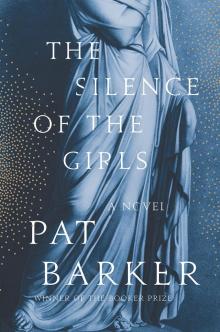 The Silence of the Girls
The Silence of the Girls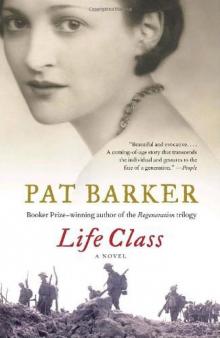 Life Class
Life Class Regeneration
Regeneration Another World
Another World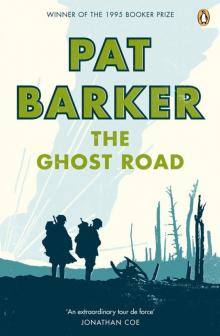 The Ghost Road
The Ghost Road Double Vision
Double Vision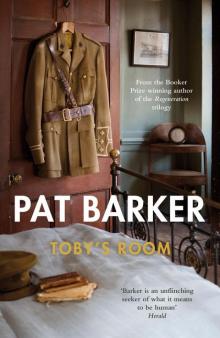 Toby's Room
Toby's Room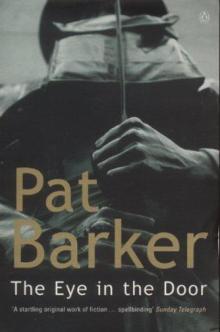 Regeneration Trilogy 02 - The Eye in the Door
Regeneration Trilogy 02 - The Eye in the Door The Eye in the Door
The Eye in the Door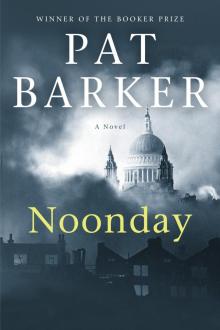 Noonday
Noonday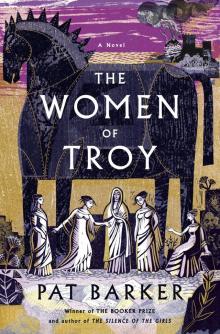 The Women of Troy: A Novel
The Women of Troy: A Novel